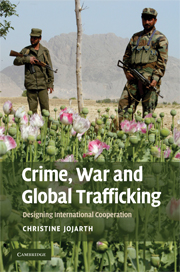Book contents
- Frontmatter
- Contents
- List of figures
- List of tables
- List of abbreviations
- Preface and acknowledgments
- 1 Introduction
- 2 The concept of legalization
- 3 Problem constellation
- 4 Narcotic drugs: UN Convention against Illicit Traffic in Narcotic Drugs and Psychotropic Substances
- 5 Money laundering: the Financial Action Task Force and its Forty Recommendations
- 6 Conflict diamonds: the Kimberley Process Certification Scheme
- 7 Small arms and light weapons: the United Nations Program of Action
- 8 Conclusion
- References
- Index
8 - Conclusion
Published online by Cambridge University Press: 02 July 2009
- Frontmatter
- Contents
- List of figures
- List of tables
- List of abbreviations
- Preface and acknowledgments
- 1 Introduction
- 2 The concept of legalization
- 3 Problem constellation
- 4 Narcotic drugs: UN Convention against Illicit Traffic in Narcotic Drugs and Psychotropic Substances
- 5 Money laundering: the Financial Action Task Force and its Forty Recommendations
- 6 Conflict diamonds: the Kimberley Process Certification Scheme
- 7 Small arms and light weapons: the United Nations Program of Action
- 8 Conclusion
- References
- Index
Summary
This study set out to test the power of a transaction cost economics based model in explaining the observed variance in the design of international institutions. In three of the four cases examined in the previous chapters, the analysis of the particular constellation underlying a trafficking-related problem did indeed lead to the right design prediction. This apparent success gives little reason for complacency. In the three cases where the expected design corresponded with the actual design the impact of problem constellation variables on design outcomes may be spurious, and the case where the model's prediction failed gives us even stronger reasons to re-examine the validity of the model's underlying assumptions.
Transaction cost economics theory, like other functionalist design theories, rests on the assumption that rational actors endow an international institution with the substance and form that are most pertinent for dealing with the governance challenges arising from a particular problem constellation, so that the institution can effectively solve the problem for which it was created. This assumption rests on two fundamental premises. First, the crafters of an international institution are rational, purposeful actors. Second, they establish an institution as a means to facilitate effective international cooperation on a policy problem. Both of these assumptions have been criticized for various reasons. The goal of this concluding chapter is therefore to examine the robustness of this study's problem-oriented design model in the light of this criticism and to explore how its reach may be expanded by accommodating elements of alternative design theories.
- Type
- Chapter
- Information
- Crime, War, and Global TraffickingDesigning International Cooperation, pp. 267 - 286Publisher: Cambridge University PressPrint publication year: 2009



